- Home
- Brian Falkner
The Tomorrow Code Page 24
The Tomorrow Code Read online
Page 24
Where the hell were those fire trucks?
Troopers had been dispatched to every fire station in the vicinity with orders to bring every machine they could find.
A smart supply sergeant had suggested a water blaster import company in West Auckland, and a small convoy of army supply trucks had been dispatched there immediately.
The first fire appliance arrived even as he was asking the question. A few more fire trucks, blood-red in the moonlight, were close on the heels of the first, and Crowe barked orders, positioning the trucks at intervals down the highway. They seemed few and far between.
A convoy of water tankers crested Sunset Ridge and made their way carefully down toward his position. Crowe swung up onto the running board of the first truck as it drew up near him.
“Seawater? You have a tank full of seawater?”
The trooper nodded. Crowe didn’t ask where they had found the trucks and didn’t much care. He jumped down and showed the trooper, with hand signals, where to go.
An explosion sounded, just over the highway. Then another, and another. The fog was getting closer and so were the blasts of the claymore mines as the creatures passed in front of their sensors. A new sound now. A low buzz from the sky. Many moving stars to the south. That would be the crop dusters, loaded, not with fertilizers or herbicides, but with water.
Salt. Water. Salt water. If they survived this long night, he was going to see that that girl got some kind of medal. They could make her the prime minister if they wanted; he’d support it. If she was right about the water, and the salt, then that might just turn the battle in their favor.
He hoped she was right. She could be right. It made scientific sense. But then, when you thought too hard about it, so did her explanation for the jellyfish and the snowmen. Certainly they had not yet come up with any other explanation for them. He shook his head violently, trying to shake out the ideas. Four of his men were dead. He wasn’t going to let her call them germs.
Rebecca was less than ten miles from Devonport when she realized that she was not going to be able to get through. Devonport was at the end of a long peninsula, stretching from the North Shore like a finger pointing across the harbor. The road had clearly clogged up early in the day, and both sides of it were choked solid with empty vehicles.
She had avoided the motorway and come down the coast, on Beach Road. There had been fewer abandoned cars and blockages along that route, but here at Takapuna there was no way through. The center of the town was a tangled web of metal.
She stopped in the middle of the road, alongside a shiny silver Porsche sports car. A large theater complex, the Bruce Mason Center, lay to her right. To her left, a series of tall towers, apartment blocks, dominated the smaller shops and terraced houses on the other side of the street and the side roads.
Lights were on in many of the apartments. People who had been unable to escape and had decided to just wait it out.
The upper two floors were alive with light. People congregating as high as they could, she thought, hoping to get above the fog.
“What do I do now, Xena?” she asked the chimp, who was curled up, apparently sleeping, on the passenger seat. “And why aren’t you wearing your safety belt?”
Xena said nothing.
She couldn’t get through. But she had to get through. If she couldn’t, then Tane and Fatboy would be stranded on the waterfront as the fog rolled down from the north.
There was a chance that Crowe and the army would stop it, but she didn’t want to count on that.
To her left, a side road led down to the Takapuna boat ramp and onto Takapuna Beach.
The beach!
She spun the wheel of the Cherokee and bulldozed the expensive little Porsche out of the way. Rubber shrieked and metal crunched, and sparks began flying off something underneath the car, but then it was to one side and she was flying down the side road.
A trailer-sailer had been abandoned at the bottom of the boat ramp, but the nose of the Jeep turned that into match-sticks. The big tires dug into the sand, and she was moving once again toward Devonport. Toward the navy base and the Möbius. Toward sanctuary.
The tide was out and the hard-packed sand above the waterline made for easier going than the soft white sand at the top of the beach.
Rebecca kept her speed as fast as she dared on the beach, in the dark, not wanting to run into any driftwood or rocks, partially buried in the sand, that might damage the big tires, or throw the Jeep off balance.
Jeeps were made for this kind of driving, though, and it was almost a cruise until she got to the end of the beach and the rocky point that separated Takapuna Beach from the next bay beyond.
She gingerly let the wheels of the Cherokee pick their way up through the rocks, hoping that the Jeep’s clearance would be high enough to pass over some of the larger rocks between her wheels.
There were harsh scraping sounds from underneath, but she kept moving forward. Then she was up over the crest of the point and bouncing over boulders down toward the sand on the other side.
Tane surveyed the battle from the ladder above the crow’s nest, a sturdy ring of metal around the outside of the Skytower; it seemed to Tane no more wide or stable than a tightrope.
The countryside was alight. The fire was spreading, and the fog disappeared in those brightly burning patches. But all around the flames the whiteness gathered, moving always southward.
Looking to the south, they could still see long lines of taillights of thousands of cars, buses, and army trucks, jammed in a desperate race to get out of the city.
They hadn’t counted on the wind. It was gusting now, in from the sea, not in a steady breeze that they could counter by leaning into, but in irregular puffs, sudden gusts that wrenched at their hands and tried to knock them from the ladder.
Technicians did climb this ladder. But they did so on calm days, with safety harnesses. Tane and Fatboy had no harnesses. And this was not calm. Or even daytime.
Already they were ten yards above the crow’s nest. Around them now was a forest of satellite dishes and aerials, some large, some small.
Tane went up the ladder, shining a torch on the serial numbers stenciled in large black letters on the base of each dish. Fatboy was fastening the Chronophone to the metal grid of the crow’s nest by winding some strong wire through loops built into the corners of the case.
The wind tore at him again, and he lost the grip of one hand, clutching desperately with his other hand and winding one knee around the ladder until the gust subsided.
He looked down and saw Fatboy spread-eagled over the top of the Chronophone. He got up, though, and nodded to show he was okay.
A few yards more and Tane found the dish they were looking for. It was massive. He didn’t need to check the number; he had memorized that long ago.
“How the hell are we going to realign that monster?” he shouted over another gust of wind.
“No worries.” Fatboy climbed up to him and passed him the end of a black cable. An identical cable was already plugged into the base of the satellite dish. Tane tried to unplug it, then realized that there was a round silver ring that had to be unscrewed first.
He let the original cable hang loose from its fastenings on the side of the tower and plugged their cable in its place, tightening up the silver ring until he could tighten it no more.
Fatboy was just below him now, and Tane swung to the side, hooking his leg around, hanging off the thin edge of a narrow metal ladder, hundreds of yards above the ground, to let his brother past.
Fatboy produced a ratchet wrench from a pocket in his leather jacket and fitted it onto a nut on the base of the dish.
“Watch the numbers,” he shouted, the wind whipping his words out into the void around them.
The dish was calibrated. There were two adjustment bolts—one to control up and down, and one for left and right.
Tane looked down at the coordinates written on the back of his hand and watched as the mouth of the di
sh began to climb skyward.
“That’s it!” he called when the red line matched perfectly with the correct white line.
Fatboy moved the wrench to the other bolt, almost dropped it, but regathered it in time, and began to turn.
“Try the other way,” Tane yelled.
The dish began to align itself.
They were almost home.
FATEFUL LIGHTNING
Manderson’s tall frame jutted out from the foxhole to his right. Next to him, a fire crew, outfitted in biosuits, manned a couple of hoses in front of their truck. The rest of Crowe’s men were spread along the side of the highway to his left. He had asked for volunteers from the Green, Orange, and Yellow Teams, and forty of the forty-eight members of those teams had flown in since the Christmas Day disaster, joining Red and Blue Teams, now dug in along the highway.
Already the streetlamps along the highway were clouded. They were on the edge of the mist.
Crowe raised his weapon. Not his usual XM8, but a common industrial water blaster. The gas-powered engine throbbed away behind him.
He made sure the setting was on its highest power and tried a short burst. The jet of water shot clear across the highway. Up and down the line, there were occasional bursts as other troopers tried out theirs.
Overhead, the tiny shapes of the crop dusters circled, waiting for instructions from the command center.
Crowe didn’t want to use them, possibly his most potent weapon, until he was sure of his targets.
The streetlights disappeared into the thickening fog, yellow halos forming around the bright stars of the bulbs. The mist lapped at the edge of his foxhole, then drifted slowly down into it, wrapping around his legs and waist as he knelt in the shallow dugout.
The fear seemed to be a part of the mist. It was palpable, so real that he thought he would choke on it. He wanted to turn, jump out of the hole, and run for his life back down the motorway toward the city.
There was something about the mist that went beyond the usual fear of going into combat. It held the fear of the unknown, and something else, too. It was impossible to describe. It was as if, not just his mind, but his very body was afraid of the mist. As if the cells that formed the structures of his being were quivering at the approach of the creeping fog.
But he could not run. This was it. This was the moment of truth for Auckland, and possibly for the human race. Right here. Right now.
Crowe knew that if he was feeling the terror, then the rest of his men, and the Kiwis ready to fight alongside them, would be feeling it, too.
A voice sounded in his earpiece, Manderson’s voice. He turned. His friend was singing. The song was an old one. Once the stirring hymn that had led the soldiers of the North against the Confederates in the American Civil War and later the battle cry of U.S. soldiers in the First and Second World Wars: “The Battle Hymn of the Republic.”
“Mine eyes have seen the glory of the coming of the Lord. He is trampling out the vintage where the grapes of wrath are stored. He hath loosed the fateful lightning of His terrible swift sword. His truth is marching on.”
Other voices were joining in now, from up and down the line. First the rest of the USABRF agents in their black combat biosuits. Then a few hesitant Kiwi accents.
He switched on his throat mike and added his voice to the chorus.
“Glory, glory! Hallelujah! Glory, glory! Hallelujah! Glory, glory! Hallelujah! His truth is marching on.”
The fog swirled up around them, and the first jellyfish struck out of the darkness before the chorus had finished. The hymn trailed off into a ragged end as the men slapped at the creatures, whose tentacles were writhing into the fabric of the biosuits.
They came straight out of the dark fog. No searching, no seeking. Guided missiles locked onto their targets, arrowing through the mist, their fine tentacles trailing behind them.
Men hammered at them, squashing them, wrenching them off the arms and bodies of their biosuits. The air was suddenly thick with the swarming creatures.
Crowe twisted the nozzle of his water blaster around to “spray” and pulled the trigger, aiming in the air above them. Five or six of the jellyfish dropped out of the air and began squirming on the ground in front of him. The surface, the skin, if that was what it was, of the creatures was fizzing and bubbling. That was the salt, Crowe realized.
“Take that, you bloodsuckers!” Manderson cried to his right.
Crowe tried another spray and sent an instruction to the crews of the fire engines.
More of the jellyfish dropped to the ground, and he saw the fire crew to his right raise one of their nozzles. A curtain of salty water appeared in front of them. A mist of their own.
The jellyfish were dropping and fizzing by the hundreds, perhaps thousands. The roadway in front of them was covered in them, wriggling for a few moments, then lying still.
The ones he had sprayed earlier were still there, he noted. The outer surface had hardened, calcified into a pale white shell. They had not absorbed back into the mist!
“Here they come!” someone called in his earpiece, and he strained his eyes to see the first of the snowmen lumbering out of the fog toward them. The noise they made was no longer a hiss. Here in the thinned-out mist, they moved more slowly and the sound was like that of wind around a house on a stormy night.
At first he saw just a few, gradually solidifying out of the mist. Then more appeared behind them; and more behind them. Suddenly they seemed to be everywhere, marching across the gray asphalt toward them.
“My God!” Manderson murmured.
“Water blasters hold till they are closer,” Crowe ordered. “Hose crews, fire at will.”
The fire hoses to his right swelled and burst forth in two heavy streams of seawater. Long wet arms that reached through the fog across the highway to the hordes of creatures that approached.
Where the high-pressure water struck, the snowmen exploded, great globs of their substance flying into the air.
Crowe watched as the closest of the creatures were all but cut in half by the saltwater jets from the fire hoses.
And yet still they marched forward.
Crowe keyed his throat mike. “Bring in the dusters, right down the highway. Right over our heads.”
There was a roar above him as the first plane made its low-level run, just above the fog, and the mist intensified as the salty sea spray drifted down around and in front of them.
Clouds of jellyfish dropped down through the mist, piling up on the highway, but the snowmen still marched forward. Their skin, too, was shriveling and bubbling with the salt, but it did not halt them.
The fire hoses were sweeping back and forth, ripping the creatures to shreds, but the fire crews were spread too thinly.
“Water blasters, pick your targets,” Crowe yelled. “Make it count!”
More tankers were already on their way, but the water was still a limited supply. Thank God, or thank Rebecca, for the salt, which prevented the fog from reclaiming its own.
A white, sluglike creature lurched toward him. Crowe sighted along the barrel of the black plastic and metal rod of the water blaster and squeezed the trigger.
The jet of water shot out, and he directed it across the chest of the creature. It punched a hole straight through the spongy material, and Crowe sawed the blade of water back and forth, cutting the creature into pieces. Manderson was doing the same.
This close, and in the lighter mist, Crowe finally came face to face with the enemy. He could see why the first to sight them had referred to them as snowmen. They looked like puffed-up human beings, inflated somehow from within, and covered in a white, gelatinous substance. They had faces, he realized. Almost human, with mouths, noses, and even eyes, but all formed from the same white spongy substance. The eyeballs, the eyelids, were white. The eyelids did not blink. The terror that had welled up in him before intensified, but he stood his ground.
He cut another couple of the creatures down, taking the legs off on
e and slicing through the neck of another.
The creatures dropped.
The jet from the fire hose swept across in front of him then, and the ragged line of snowmen faltered for the first time. Crowe hacked at the creatures with the blast of water from his weapon and found he was whooping with exhilaration.
They were winning. The line was holding!
“The mist is thickening,” Manderson called, next to him.
“Get those fighters in here,” Crowe shouted. “Close support. Light up the other side of the road, see if we can thin out the mist a little.”
The fog was indeed thickening, he realized, and the creatures were starting to move faster. He ripped another couple apart. The mass of the creatures’ flesh was filling the roadway. Overhead, the crop dusters swooped, covering the bodies of the creatures with brine, shriveling and fizzing.
Across the highway, lightning flashed and he ducked down into his foxhole for a moment as the shock wave of multiple explosions shook the ground around them.
Lucy Southwell’s voice on the radio then, from the command center, three hundred feet behind the line.
“Crowe, this is Lucy. The evacuation is nearly complete, but we’ve lost all contact with the easternmost sections of the line.”
“My God!” Manderson said for the second time that night, only this time it sounded like a prayer.
SILENCE IN THE MIST
Ramirez pulled up and watched below him as the last of his air-to-ground missiles impacted on the grassy strip, not even a hundred yards from where the troops cowered in their foxholes on the other side of the highway.
Now that was precision flying and precision targeting.
The crop dusters had left now, having exhausted their tanks. His aircraft were also out of bombs and missiles and were already heading back to the carrier to re-arm.
Ramirez alone remained over the battleground, circling, to feed information back to the carrier and to the troops on the ground.
The line was holding here at Albany, he saw, and also out to the west. But the east coast suburb of Mairangi Bay had been long swallowed by the dense white cloud, which had outskirted the defensive line, floating slowly out to sea and back in again behind it.

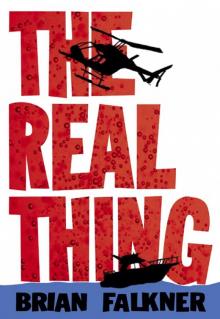 The Real Thing
The Real Thing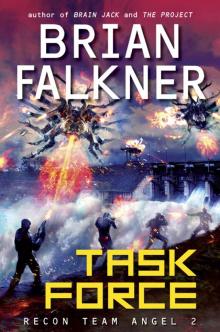 Task Force
Task Force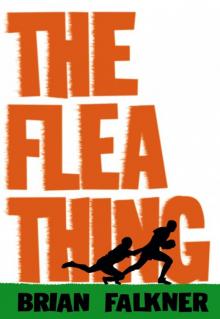 The Flea Thing
The Flea Thing The Project
The Project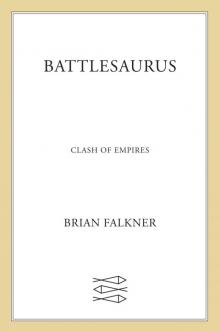 Clash of Empires
Clash of Empires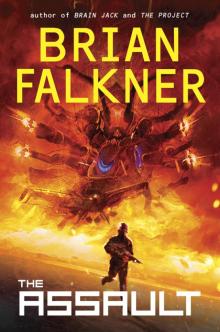 The Assault
The Assault Brain Jack
Brain Jack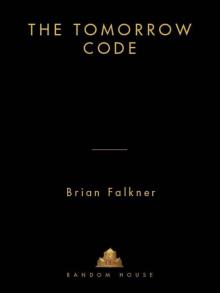 The Tomorrow Code
The Tomorrow Code Vengeance
Vengeance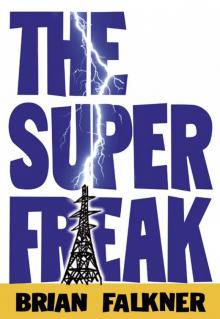 The Super Freak
The Super Freak Northwood
Northwood Cave Dogs (Pachacuta Book 1)
Cave Dogs (Pachacuta Book 1)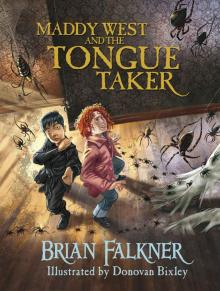 Maddy West and the Tongue Taker
Maddy West and the Tongue Taker